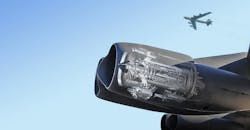Spirit Supplying Engine Structures for B-52 Updates
Boeing Co. placed a contract with Spirit AeroSystems to provide engine pylons and nacelles for initial phase of the B-52 Commercial Engine Replacement Program (CERP), a U.S. Air Force program to replace 608 engines for is fleet of B-52H aircraft.
The B-52H, or B-52 Stratofortress, is a Boeing-built long-range bomber aircraft that first entered service with the USAF in 1955. Under a $2.6-billion, September 2021 contract, Rolls-Royce will supply 608 F130 engines as replacements, plus 42 spare units for a total of 650 engines.
The F130 is the military designation for the Rolls-Royce BR700 series of twin-shaft, turbofan engines. Each B-52 is powered by eight engines housed in individual nacelles, in four pairs, with each pair suspended by four pylons beneath and forward of the wings' leading edge.
The value of the award to Spirit AeroSystems was not announced.
Wichita-based Spirit manufactures aerostructures for commercial, defense, and business/regional aircraft, including aluminum and composite components for fuselages, integrated wings and wing components, pylons, and nacelles. It is one of the world’s largest suppliers of engine pylons, and currently builds the nacelle for the commercial variant of the Rolls F130 engine.
“Spirit will apply its vast experience building and delivering thousands of engine struts and nacelles for commercial applications on the CERP program,” stated Jarrod Bartlett, Defense & Space Business development manager. “We look forward to supporting Boeing to help keep the B-52 a ready and reliable weapon system for the Air Force.”
The CERP program is intended to extend the B-52 bomber’s service life through at least 2050, part of a $14.3-billion, 2019 Dept. of Defense award to Boeing Defense, Space & Security for modification, modernization, engineering, and testing of weapons systems for the B-1 and B-52 bombers.
